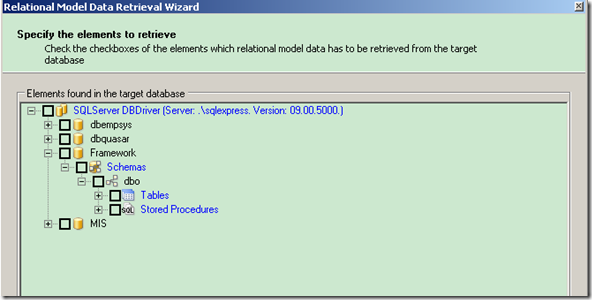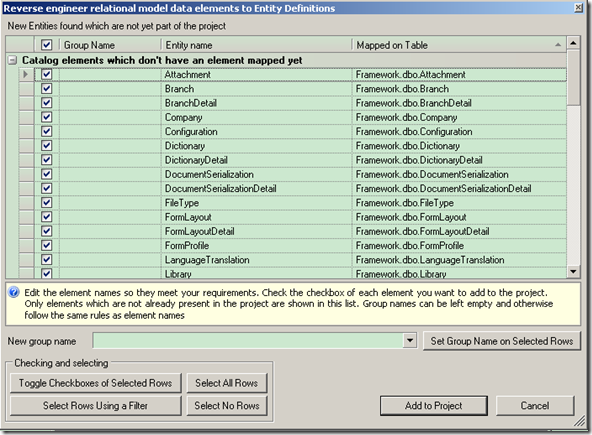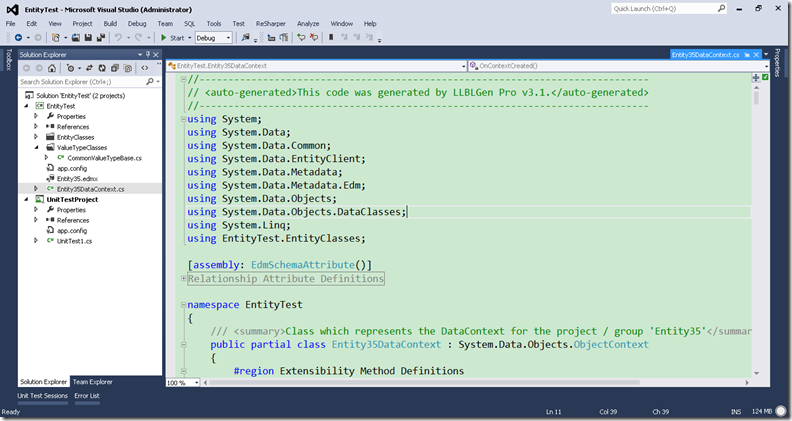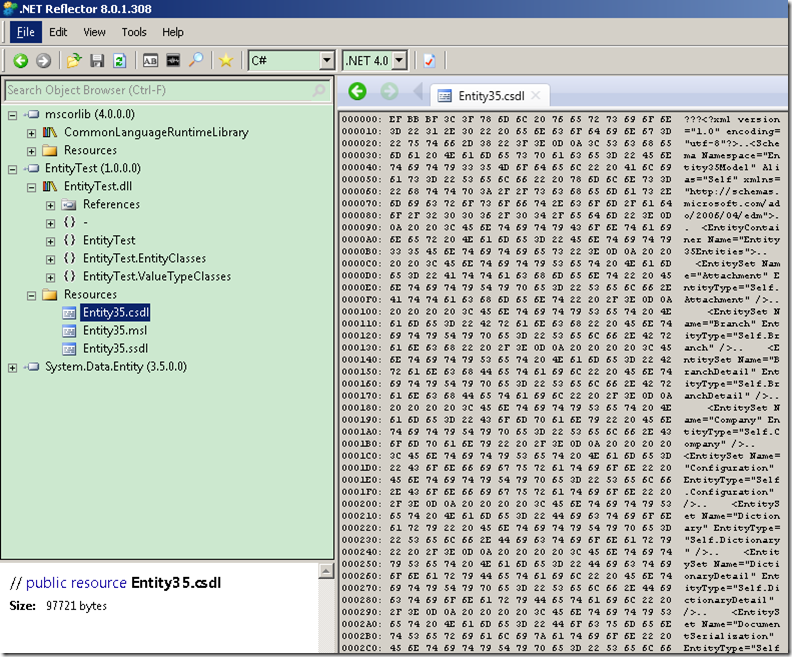LLBL Gen + Entity Framework 程序设计入门
Entity Framework推出有好几年,除了微软的Visual Studio可以做实体框架开发外,第三方的开发工具如LLBL Gen,
Devart Entity Developer也可以用来做设计开发。
设计数据库表Configuration,它的SQL定义如下
IF OBJECT_ID ('dbo.Configuration') IS NOT NULL DROP TABLE dbo.Configuration GO CREATE TABLE dbo.Configuration ( Recnum INT IDENTITY NOT NULL, MasterKey NVARCHAR (50) NOT NULL, Description TEXT NULL, Remark NVARCHAR (400) NULL, CONSTRAINT PK_X_Config PRIMARY KEY (MasterKey) ) GO
打开LLBL Gen,创建一个新项目,选择Entity Framework v1
这里还有其它版本的Entity Framework。对应关系如下
Entity Framework v1 => Entity Framework 3.5 SP1
Entity Framework v4 => Entity Framework 4/4.5
再到Category Explorer窗口中,选择添加数据库映射,选择数据库类型,设置连接参数
生成实体模型,继续在Category Explorer窗口中,把表添加到当前项目的实体中,如下图所示
验证实体类型,准备生成代码,但是出现以下几个错误:
The Entity "FileType" contains field "FileType" which has the same name as its containing element,something which isn't supported by the Entity Framework
映射的实体名字段中,不能包含与实体名称一样的字段。比如,我有一个FileType的表,映射到FileType实体,它包含一个FileType的主键字段,自动生成映射时,这是不允许的。
清除这个错误之后,按F7生成代码,用Visual Studio 2012打开项目,如下图所示
LLBL Gen代码生成器帮忙我们生成Entity Framework所需要的edmx文件,类型定义和DataContext类型。
来看一下生成的类型定义代码,Configuration表映射的实体类型Configuration实体,它的代码如下
/// <summary>Class which represents the entity 'Configuration'.</summary> [Serializable] [DataContract(IsReference=true)] [EdmEntityType(NamespaceName="Entity35Model", Name="Configuration")] public partial class Configuration : CommonEntityBase { #region Class Member Declarations private System.String _description; private System.String _masterKey; private System.Int32 _recnum; private System.String _remark; #endregion #region Extensibility Method Definitions partial void OnDescriptionChanging(System.String value); partial void OnDescriptionChanged(); partial void OnMasterKeyChanging(System.String value); partial void OnMasterKeyChanged(); partial void OnRecnumChanging(System.Int32 value); partial void OnRecnumChanged(); partial void OnRemarkChanging(System.String value); partial void OnRemarkChanged(); #endregion /// <summary>Initializes a new instance of the <see cref="Configuration"/> class.</summary> public Configuration() : base() { } /// <summary>Factory method to create a new instance of the entity type 'Configuration'</summary> /// <param name="masterKeyValue">The initial value for the field 'MasterKey'</param> /// <param name="recnumValue">The initial value for the field 'Recnum'</param> public static Configuration CreateConfiguration(System.String masterKeyValue, System.Int32 recnumValue) { var toReturn = new Configuration(); toReturn.MasterKey = masterKeyValue; toReturn.Recnum = recnumValue; return toReturn; } #region Class Property Declarations /// <summary>Gets or sets the Description field. </summary> [DataMember] [EdmScalarProperty()] public System.String Description { get { return _description; } set { OnDescriptionChanging(value); this.ReportPropertyChanging("Description"); _description = SetValidValue(value, true); this.ReportPropertyChanged("Description"); OnDescriptionChanged(); } } /// <summary>Gets or sets the MasterKey field. </summary> [DataMember] [EdmScalarProperty(EntityKeyProperty=true, IsNullable=false)] public System.String MasterKey { get { return _masterKey; } set { if(_masterKey==value) { return; } OnMasterKeyChanging(value); this.ReportPropertyChanging("MasterKey"); _masterKey = SetValidValue(value, false); this.ReportPropertyChanged("MasterKey"); OnMasterKeyChanged(); } } /// <summary>Gets or sets the Recnum field. </summary> [DataMember] [EdmScalarProperty(IsNullable=false)] public System.Int32 Recnum { get { return _recnum; } private set { OnRecnumChanging(value); this.ReportPropertyChanging("Recnum"); _recnum = SetValidValue(value); this.ReportPropertyChanged("Recnum"); OnRecnumChanged(); } } /// <summary>Gets or sets the Remark field. </summary> [DataMember] [EdmScalarProperty()] public System.String Remark { get { return _remark; } set { OnRemarkChanging(value); this.ReportPropertyChanging("Remark"); _remark = SetValidValue(value, true); this.ReportPropertyChanged("Remark"); OnRemarkChanged(); } } #endregion }
LLBL Gen让生成的实体类型派生于CommonEntityBase,这个类型派生于EntityObject,定义如下
/// <summary>Class which is the common base class for all generated entity classes.</summary> /// <remarks>As all non-subtype entity classes derive from this class, use a partial class of this class to implement code which is shared among all generated entity classes</remarks> [DataContract(IsReference = true)] [Serializable] public abstract partial class CommonEntityBase : EntityObject { #region Class Extensibility Methods /// <summary>Method called from the constructor</summary> partial void OnCreated(); #endregion /// <summary>Initializes a new instance of the <see cref="CommonEntityBase"/> class.</summary> protected CommonEntityBase() : base() { OnCreated(); } }
可以在这个类型中,创建一些公共的方法以方便在生成的实体类型中使用。
LLBL Gen为实体框架的实体的每个属性添加了二个跟踪机制方法:Changing和Changed方法。这里可以写我们实体的业务逻辑。比如在采购单中,用户改变单价时,自动重新计算金额(金额=数量*单价)。
以备注属性为例子,请看下面的代码
/// <summary>Gets or sets the Remark field. </summary> [DataMember] [EdmScalarProperty()] public System.String Remark { get { return _remark; } set { OnRemarkChanging(value); this.ReportPropertyChanging("Remark"); _remark = SetValidValue(value, true); this.ReportPropertyChanged("Remark"); OnRemarkChanged(); } }
partial void OnRemarkChanging(System.String value); partial void OnRemarkChanged();
这二个方法都是partial方法,如果我们没有定义方法体,则编译时,它会被忽略。partial方法是C# 3.0才引入的特性,为方便代码生成器与开发人员之间的合作更紧密。试想一下,怎么在不修改代码生成器生成的方法的情况下,添加自定义的业务代码到类型的方法,属性中去呢?答案是partial方法。
同时,因为生成的实体类型已经加了partial关键字,所以我们可以再加入一个同名的实体类型,用来写业务逻辑,而不更改代码生成器自动生成的代码。
最后,写一个测试方法,让它读取系统的配置表Configuration中的数据:
public static void Main(string[] args) { Entity35DataContext entity35DataContext = new Entity35DataContext(); var configurations = from item in entity35DataContext.Configurations select item; foreach (var dbDataRecord in configurations) { string companyCode = dbDataRecord.MasterKey; } }
一行代码即可完成数据库的读取,而且读取的数据是强类型,非常方便。
一般在入门例子中,容易出错的地方是配置文件的内容,来看一下App.config文件的内容:
<?xml version="1.0" encoding="utf-8" ?> <configuration> <connectionStrings> <!-- please adjust the connection string embedded in the element below to target the proper catalog / server using the proper user / password combination --> <add name="ConnectionString.SQL Server (SqlClient)" connectionString="metadata=res://*/Entity35.csdl|res://*/Entity35.ssdl|res://*/Entity35.msl;provider=System.Data.SqlClient;provider connection string="data source=.\sqlexpress;initial catalog=Framework;integrated security=SSPI;persist security info=False;packet size=4096"" providerName="System.Data.EntityClient" /> </connectionStrings> </configuration>
这里是设置连接字符串的地方,从生成的ObjectContext类型中,可以看到不带参数的构造方法为从这里读取连接字符串,它的其它的几个方法,如下代码所示
/// <summary>Initializes a new instance of the <see cref="Entity35DataContext"/> class using the connection string found in the 'Entity35' section of the application configuration file.</summary> public Entity35DataContext() : base("name=ConnectionString.SQL Server (SqlClient)", "Entity35Entities") { Initialize(); } /// <summary>Initializes a new instance of the <see cref="Entity35DataContext"/> class</summary> public Entity35DataContext(string connectionString) : base(connectionString, "Entity35Entities") { Initialize(); } /// <summary>Initializes a new instance of the <see cref="Entity35DataContext"/> class</summary> /// <param name="connection">Ready to use EntityConnection object to be used with this context</param> public Entity35DataContext(System.Data.EntityClient.EntityConnection connection) : base(connection, "Entity35Entities") { Initialize(); }
Entity Framework的连接字符串与经常写的SQL Server的SqlConnection的字符串有所区别,要指定依据edmx生成的三个文件的位置,因为edmx文件的Build Action为EntityDeploy,所以它会被嵌入到生成的程序集中。
用.NET Reflector载入生成的实体程序集,查看它的资源文件,如上图所示,三个资源文件被嵌入在程序集中。









 浙公网安备 33010602011771号
浙公网安备 33010602011771号